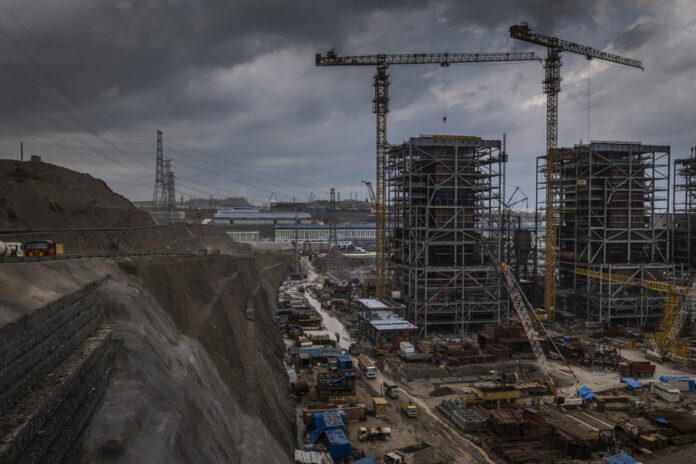Since his birth 57 years ago on the island of Sulawesi, Jamal has mostly known deprivation, unemployment and a life without a future. People sold sand, fished and did small farming. Getting a chicken stolen by a hungry neighbor was common.
Jamal (like many Indonesians, he only has one name) often commuted by motorbike to work in construction in Kendari, half an hour away.
Then, six years ago, a huge foundry rose near his home. The plant was built by PT Dragon Virtue Nickel Industry, a subsidiary of a Chinese mining giant, Jiangsu Delong Nickel.
In 2020, Indonesia banned the export of raw nickel to attract processing investment. Chinese industry arrived in force and built dozens of foundries. China thus secured the supply of nickel for its electric automobile industry and the manufacture of batteries. In addition, it kept the pollution generated by the refining of nickel away from Chinese cities.
Jamal found a job building dormitories for laborers from other parts of Sulawesi, the island formerly known as Celebes. He increased his income by building seven rental units in the house where he was born and raised. His son-in-law was hired at the foundry. At Jamal’s, a new air conditioner reduces the humidity of the tropical air. He recently laid ceramic tiles on the once bare concrete floor.
He and his family complain about the dust and acrid smoke coming from the smelter and the trucks driving past at all hours loaded with raw ore. Some days, residents have to wear masks and struggle to breathe. Lung problems are on the rise.
“That’s how it is,” Jamal said. The air is bad, but we live better. »
At the Cinta Jaya mine on the southeast coast of Sulawesi this morning, dozens of excavators tear through the reddish soil, loading the earth onto dump trucks that transport it to the Banda Sea. There, they unload the ore onto barges bound for smelters elsewhere on the island.
Nickel goes north to Morowali Industrial Park, a complex of 50 factories spanning 4,000 hectares. This gated enclave has its own airport, seaport, and centralized kitchen that prepares 70,000 meals a day. The park was established in 2013 through an agreement announced by then Indonesian President Susilo Bambang Yudhoyono and Chinese President Xi Jinping. The China Development Bank has lent more than $1.2 billion.
About 6,000 Chinese workers live there in dormitories, their laundry drying on the railings. The visiting Chinese executives sleep in a five-star hotel run by Tsingshan, a Chinese company that has built a foundry making battery components for electric cars. From the restaurant, which serves dim sums and rice porridge, you can see the pier where trucks are unloading their cargo.
Five million tons of nickel ore lie on a hill overlooking the harbor – a gigantic stockpile. In a building the size of several aircraft hangars, mountains of coal wait to be transported to the power plant.
Other barges leaving the nickel mine sail south to the Morosi district, where Jamal lives, near two Chinese smelters that have – for better and for worse – upended people’s lives.
The Obsidian Stainless Steel factory, another subsidiary of the Delong group, dominates the surrounding rice fields. At the end of the afternoon shift, workers stream out of the factory and head on motorbikes to their sleeping quarters nearby. Many of them, from mainland China, stop at shops and restaurants adorned with signs displaying Chinese characters.
Outside his shop, Wang Lidan cooks squid on the barbecue, while touting his other delicacies: shallot pancakes, fried dumplings, ice cream bars and pickled radishes in jars.
Raised in Xiamen, southern China, she has lived in Indonesia for 30 years. She sold jewelry imported from China to tourists on the resort island of Bali and ran a modest restaurant in Jakarta, the capital.
She arrived here five years ago after hearing that thousands of Chinese workers were on their way to a remote part of Sulawesi to work in the new smelters. She rented a shack with plastic sheeting and corrugated iron roofing, where she set up a restaurant. She slept on a wooden bench in the kitchen.
Eno Priyanto, an Indonesian, has also just opened a restaurant, where he serves seafood and satays. “Before, here, it was a swamp. It’s much better now,” he said.
But behind the smelter, the farmers mourn their dashed hopes.
Rosmini Bado, 43, a mother of four, lives in a house on stilts planted in front of her rice fields. She now has a view of the chimneys and a concrete wall at the end of her lot. It’s all that separates his livelihood from the smoldering piles of scrap dumped there after the ore has been refined.
This year, just after sowing, his land was flooded by a violent storm. Before the construction of the plant, the drainage would have evacuated the water. Not anymore: the concrete wall kept water on its plot, destroying a crop worth 18 million rupees (nearly C$300,000).
The fish she raises in ponds no longer reach their normal size. The locals blame the toxins seeping into everything.
Her husband and son were not hired at the factory.
In Sulawesi’s nickel belt, local workers know they earn far less than their Chinese counterparts, many of whom are foremen.
Workers cruising the surrounding roads on motorcycles wear hard hats whose colors indicate their rank: yellow for the first echelon, red for the next echelon, then blue and white. It is no secret that almost all Indonesians have yellow helmets, while blue and white are the prerogative of Chinese workers.
“It’s unfair,” Jamal says. The Indonesians work harder, while the Chinese point and tell them what to do. »















